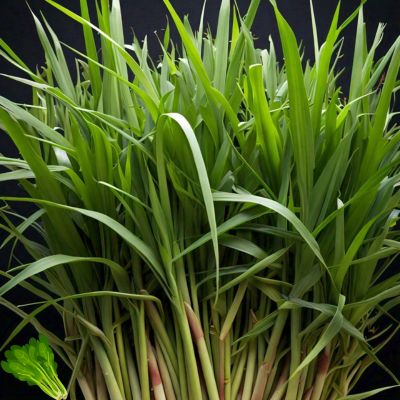Lemongrass, sometimes known as citronella, is a tall, aromatic grass with a unique, lemony scent that brings fresh flavor to many dishes. Widely used in Southeast Asian cuisine, lemongrass imparts a vibrant, citrus flavor to teas, marinades, curries and broths. However, beyond its culinary uses, lemongrass and its essential oil have been valued in traditional medicine for centuries and some of these benefits are backed by modern science. This guide will dive into the key benefits, nutritional profile and safety considerations for lemongrass.

Health Benefits of Lemongrass
Lemongrass offers several health benefits due to its natural compounds and essential oil properties, making it a versatile addition to a healthy lifestyle.
1. Digestive Support
Lemongrass tea is traditionally used to aid digestion. The tea can help soothe common stomach issues, such as indigestion and cramps and may protect the stomach lining, reducing the risk of gastric ulcers. Studies have found that certain compounds in lemongrass can relieve stomach discomfort, supporting overall digestive health.
2. Anxiety and Stress Relief
When inhaled or consumed, lemongrass has a calming effect that may help reduce anxiety. Lemongrass essential oil, in particular, is used in aromatherapy to promote relaxation and stress relief. Inhaling its soothing scent has been associated with reduced symptoms of anxiety and improved mood.
3. Natural Pain Relief
Applied topically, lemongrass essential oil can provide relief from musculoskeletal pain, headaches and inflammation. The oil contains anti-inflammatory and analgesic compounds that can reduce discomfort in sore muscles and joints when rubbed into the skin.
4. Immune Support and Cold Relief
Lemongrass has antimicrobial properties that make it useful for treating colds and flu symptoms. Its essential oil can be used in a diffuser or inhaled to help relieve congestion, cough and mild respiratory issues.
5. Additional Health Benefits
Traditional uses of lemongrass include managing fever, hypertension and sleeplessness. While research in these areas is still emerging, some evidence supports lemongrass’s potential in promoting overall well-being.
Lemongrass Essential Oil: Benefits and Uses
Lemongrass essential oil is more concentrated than the fresh herb and contains high levels of beneficial compounds, including citral, geraniol and citronellal. These active compounds contribute to the oil’s powerful antifungal, antibacterial and anti-inflammatory properties.
1. Antifungal and Antibacterial Effects
Lemongrass essential oil is effective against certain fungi and bacteria. Studies show it can reduce dandruff by inhibiting fungal growth on the scalp. Its antimicrobial properties may also help with skin infections and other bacterial issues.
2. Antioxidant and Anticancer Potential
The essential oil is rich in antioxidants, which help protect cells from damage caused by free radicals. Some preliminary studies have even shown that lemongrass essential oil exhibits anticancer properties. However, more research is needed to confirm its effectiveness in cancer prevention or treatment.
3. Skin Health
Due to its antimicrobial and anti-inflammatory qualities, lemongrass oil can be used in skincare routines to manage oily skin, acne and minor wounds.
Nutritional Profile of Lemongrass
While lemongrass is low in calories, it provides essential nutrients, including vitamins A, B and C, which are beneficial for the immune system, skin and cellular health.
- Vitamins and Minerals
Lemongrass provides a variety of vitamins and minerals, including calcium, potassium, magnesium, and iron. Although the amounts are not high enough to make a major impact on daily nutrition, they contribute to a balanced diet.
- Antioxidants
Lemongrass contains natural antioxidants, which help protect cells and tissues from oxidative damage, promoting long-term health.
Selecting, Preparing and Storing Lemongrass
Lemongrass is now more accessible in grocery stores and specialty Asian markets. When selecting fresh lemongrass, choose stalks that are firm, green, and have healthy-looking bulbs. Here are some preparation tips:
- Using Fresh Lemongrass
To release its aroma and flavor, crush the bottom part of the stalk before adding it to dishes. This is especially useful in soups, broths and teas, where the stalks can be simmered and then removed before serving.
- Storage Tips
Store fresh lemongrass in the refrigerator wrapped in a damp paper towel to maintain its freshness. If you have dried or powdered lemongrass, keep it in a cool, dark place.
Potential Side Effects and Precautions
While lemongrass is generally safe when used in culinary amounts, caution is advised when using it for medicinal purposes or applying its essential oil directly to the skin.
- Skin Irritation
Lemongrass oil is potent and may cause skin irritation if applied directly without dilution. To avoid irritation, always dilute the oil with a carrier oil (like coconut or olive oil) before applying it topically.
- Digestive Concerns
Consuming high amounts of lemongrass can lead to side effects, including increased urination, dry mouth and an increase in appetite. It’s best to use lemongrass in moderate amounts, especially if taken as tea or in supplement form.
- Liver and Kidney Considerations
Excessive intake of lemongrass essential oil or tea may have adverse effects on liver and kidney health. It is advised to avoid high doses, particularly if you have a history of liver or kidney issues.
- Pregnancy and Chemotherapy Warnings
Pregnant women should avoid lemongrass in high doses, as animal studies have shown potential risks. Additionally, people undergoing chemotherapy should be cautious with lemongrass use, as it may interfere with some treatments.
Conclusion
Lemongrass is a flavorful herb that provides culinary excitement and several health benefits. Its essential oil, rich in potent compounds, offers additional uses in natural medicine, from reducing anxiety to supporting skin health. However, moderation is key when using lemongrass for medicinal purposes and it’s wise to consult a healthcare provider if you’re considering adding lemongrass essential oil to your wellness routine.
Incorporating lemongrass into your diet is a simple way to enjoy its unique taste and potential health benefits. Whether used in teas, dishes or as an essential oil, lemongrass adds a refreshing twist while supporting your health in various ways.
Frequently Asked Questions
Q1. What are the main culinary uses of lemongrass?
Lemongrass adds a fresh, citrusy flavor to soups, teas, curries, and marinades, especially in Southeast Asian dishes.
Q2. How do you prepare fresh lemongrass for cooking?
Trim the stalk, peel the outer layer, and crush or finely chop the lower part for maximum flavor. Remove it before serving if used whole.
Q3. Can lemongrass be used in tea?
Yes, lemongrass is popular in teas for its soothing, refreshing taste. Simply boil fresh stalks or dried lemongrass in water.
Q4. What are the health benefits of lemongrass tea?
Lemongrass tea may aid digestion, relieve anxiety, and help with sleep, thanks to its calming and anti-inflammatory properties.
Q5. Is lemongrass oil safe for topical use?
Diluted lemongrass oil can be applied to skin to relieve pain and reduce inflammation, but a patch test is recommended to avoid irritation.
Q6. Can I use lemongrass in desserts?
Yes, lemongrass adds a unique twist to desserts like custards, sorbets, and syrups, pairing well with coconut and citrus flavors.
Q7. How should lemongrass be stored?
Store fresh lemongrass in the refrigerator wrapped in a damp paper towel. It can also be frozen for longer storage.
